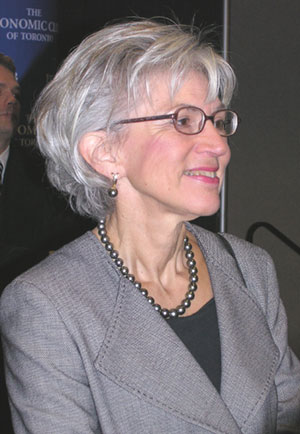Lawyers need to do their bit to stop Canada’s justice system from becoming the preserve of the very richest in society, says the country’s top judge.

Supreme Court of Canada Chief Justice Beverley McLachlin told a group of leading lights in the legal world that the profession’s monopoly over the provision of legal services conferred with its special responsibilities.
“If you’re the only one that can provide a fundamentally vital social need, from which you benefit, I think it follows that you have to provide it. And I don’t think it’s enough to say we’re providing it for the rich and for corporations.
I think you have to find a way to provide it for everybody,” McLachlin said. “No one else can provide this, so the legal profession must.”
McLachlin was the keynote speaker at the University of Toronto Faculty of Law’s Middle Income Access to Civil Justice Colloquium on Feb. 10. It explored the problems middle-income people have in finding adequate legal representation.
McLachlin said full representation is out of the question for many, with average legal fees hovering in the range of $340 per hour. Low legal aid cut-offs have made that option equally unrealistic for the growing group caught between two financial extremes.
“Do we have adequate access to justice? I think the answer is no. Among those hardest hit are the middle class and the poor. We have wonderful justice for corporations, and for the wealthy.
But the middle class and the poor may not be able, in many situations we have found, to access our justice system,” said McLachlin. “Public confidence in the system of justice is essential. How can there be confidence in a system that shuts people out, that does not give them access.”
McLachlin said the situation must change if Canada’s justice system wishes to retain its reputation as one of the best in the world.
“We can draft the best rules in the world, we can render the most enlightened decisions, but if people can’t take advantage of that body of law, if they cannot have access to it to resolve their own legal difficulties, then it is for nought,” she said.
Ontario’s Attorney General Chris Bentley said his government is working to tackle the problem, but warned the tough economic climate meant very little new resources were available for the cause. In any case, “there is no appetite among middle-income Ontarians, or anyone else, to pay more money for access to justice,” said Bentley.
“It would be ironic if we asked them to, because by definition we’re saying they don’t have access to the system of justice that they should have, and that they already pay for,” he said.
Instead, Bentley said he has worked with the profession to develop programs that assist low- and middle-income people in the system. He pointed to the recent amendments to the Rules of Civil Procedure, which increased the monetary limit in the cheaper and faster Small Claims Court.
In family law, he promoted a pilot that mandates information sessions for all litigants and provides them with upfront access to duty counsel; “triage” lawyers who point them in the most suitable direction for their case. More Small Claims Court forms have gone online, with advice on how to fill them out, alongside an information hotline.
“People want information, upfront in an easy to understand way,” said Bentley. “They want a little bit of advice on whether it’s worthwhile proceeding, and better if it’s free. Then they want to get to the decision point as quickly as possible.”
But professor Russell Engler, another speaker at the conference, warned the multitude of self-help programs that have sprung up around court systems across the continent can have unwelcome side-effects.
“There is a very real danger that the trade-off is second-class justice for those who can’t pay,” he said.
Engler, who is the director of clinical programs at the New England School of Law in Boston, highlighted a study of a self-help legal centre in California, which was very popular among people who used it, and court staff whose lives were made easier by its existence.
But the study also found that in landlord-tenant cases, where the power imbalance is often greatest between litigants, tenants who used the self-help centre ended up paying more in back rent than those who went it alone.
“We can have a philosophical discussion as to whether it’s a good or bad thing that tenants pay their rent. But if we’re trying to design programs to assist people, I’m going to make a case that they are better off with more money in their pocket than less money,” Engler said.
“The theory is that the self-help centre acted as a dispenser of norms, so that tenants had their expectations lowered about what was achievable. Whether we want our assistance programs to be dispensers of norms or whatever we want them to be, that should at least be part of the conversation.”
According to Engler, program evaluations must focus on actual outcomes, rather than just customer-service style surveys, which can only tell you about how well people felt they were served by a particular program.
“Unless we do that, however well-intentioned we are, I think we’re never going to know whether we actually have expanded and provided equal access to justice, or whether we are providing second-class justice, despite our best intentions,” he said.

 Supreme Court of Canada Chief Justice Beverley McLachlin told a group of leading lights in the legal world that the profession’s monopoly over the provision of legal services conferred with its special responsibilities.
Supreme Court of Canada Chief Justice Beverley McLachlin told a group of leading lights in the legal world that the profession’s monopoly over the provision of legal services conferred with its special responsibilities.